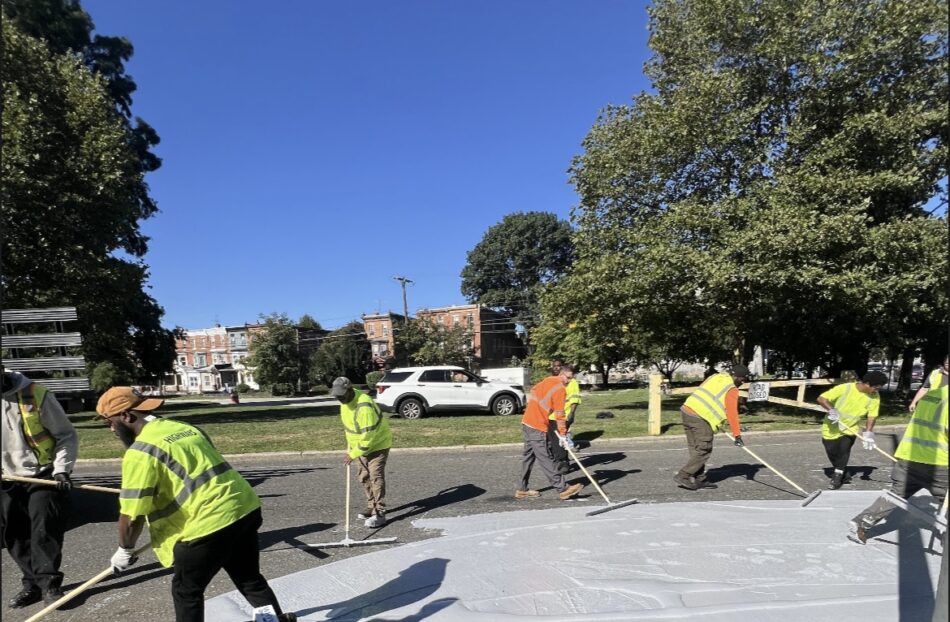
The Hunting Park neighborhood in North Philadelphia is considered one of the hottest and most heat-vulnerable places in the city, according to the Philadelphia Heat Index. The Heat Index recorded over 20 days in the summer of 2024 with temperatures over 90 degrees, and that number is predicted to increase in the coming years.
Hunting Park is considered an “extreme heat island.” A heat island is an urban area that is significantly warmer than its surrounding rural areas because of human structures and activities. Buildings and roads absorb and re-emit the sun’s heat, contributing to rising temperatures and hotter days.
A new program is being tested in the neighborhood as a solution to this problem. Cooling pavement, a pilot project in Hunting Park, aims to lower average temperatures during the summer.
The project is testing the use of a light-colored heat reflective sealant on top of patches of road. The technology helps bounce off heat from the sun into the atmosphere rather than into the ground. The goal of this project is to hopefully lower the air temperature, surface temperature, and mean radiant temperature.
The cooling pavement costs around $0.60 to $0.80 per square foot. Researchers are hoping that enough information and data will be found within the coming months of this project to determine its benefits.
Andrew Dodd is a place-based heat program manager for the City of Philadelphia’s Office of Sustainability. He works directly with members of the Hunting Park community, as well as with researchers from the University of Pennsylvania who are researching the effectiveness of the cooling pavement technology.
Philadelphia Neighborhoods sat down with Dodd to understand more about the project and his work with climate justice in the city.
PN: “Can you tell me about the moment you decided to get involved with the cooling pavement and the process of that?”
Andrew Dodd: “The cooling pavement idea really started through Esperanza, an organization in North Philly, which works closely with Hunting Park. We thought that this cool pavement project had a lot of great work that needed to be done, so we wanted to help improve it and the surrounding neighborhoods. The cooling pavement is a great continuation of work that’s been done in the past, and we want to continue that work and be collaborative to make the city safer. Hunting Park has a lot of great heat resiliency work being done there, and we want to help them.”
PN: “How are you working with residents in Hunting Park in order to combat climate change?”
Andrew Dodd: “I think that it is key, before you do any work, to meet the residents where they are at. Go to them, go to the community meetings, partner up with some of the key trusted messengers in their neighborhoods. Going to events and being out in the neighborhood, going to block parties and showing your face, people start to trust you, and you can really see what they are advocating for.”
PN: “What has been the process of the cooling pavement in Hunting Park?”
Dodd: “Phase one began last summer, where we put one coating of the cooling pavement on certain roads in Hunting Park. Throughout this phase, we worked with many researchers from the University of Pennsylvania, who took many measurements and temperature measurements. Phase two happened this past August, and again, we talked with researchers from the University of Pennsylvania. We start collecting some of those measurements in phase two, and that will be completed by September of 2027.”
PN: “What made you interested in mainly focusing on Hunting Park?”
Dodd: “This neighborhood is at high risk of extreme heat vulnerabilities. These types of neighborhoods lack live feed coverage, don’t have cooling supports in place, and have a lot of asphalt. This leaves a lot of residents vulnerable to the adverse effects of extreme heat, different health effects, and dehydration. We wanted to focus on neighborhoods that already have a pretty good community that’s very active in a lot of other spaces, and it’s also important to recognize that some groups are more vulnerable to climate change than others, particularly those who have been marginalized. A lot of black and brown people have been historically oppressed, and the systems are still in play today.”
PN: “We know that Hunting Park is a neighborhood comprised mostly of low-income communities of color. 59% of residents identify as Black or African American, 36% identify as Hispanic or Latino, and 44% of neighborhood residents live below the poverty line. Compared to 24% citywide. How does institutionalization of racism play into the effect of climate change? What do you believe are the root causes of climate change?”
Dodd: “This is complicated. There isn’t just one issue; it’s a combination of things. I think, firstly, there is an institution of oppression that is taking place in this country. Take neighborhoods like Hunting Park; in the early 20th century, it was very affluent, then, unfortunately, there was a lot of white flight that happened. When that happened, a lot of the investment in the neighborhood went away, and without those resources and investments, places like parks and cooling centers were more vulnerable. So I think there are a lot of reasons, but a lot of the neighborhoods in Philadelphia, particularly, have been divested from.”
PN: “What gives you hope about the future?”
Dodd: “When I do my work in neighborhoods like Hunting Park, the communities are really engaged, and that is really key. It’s collaborative. You can see that collaboration, and when you know the residents are really engaged and activated, that’s really empowering to see. People are just really engaged and willing to be collaborative, which gives me hope. That really excites me, and finding ways to keep people cool and safe during the extreme heat waves, with cooling pavements and cooling roofs, I’m all for it.”


Be the first to comment